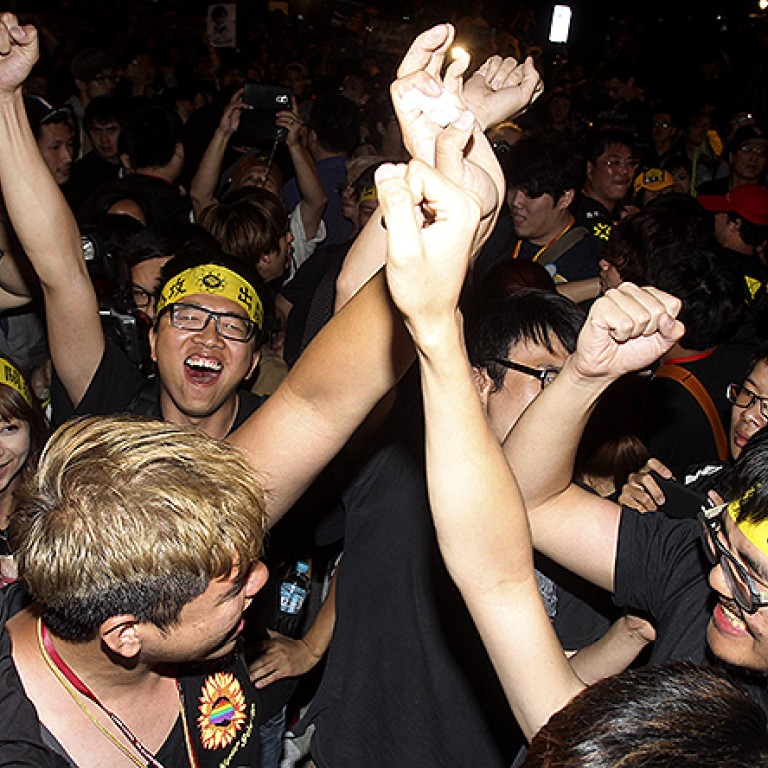
Taiwan’s student movement is a lesson in how democracy works
Stephen Vines says Taiwan's student movement sets us a fine example
What lessons should Hong Kong draw from Taiwan's so-called Sunflower Movement? As ever, the usual suspects have concluded that Taiwan's democracy led to chaos, and they even claim that what happened in Taipei "proves" that democracy is not a suitable model for governing a Chinese society.
Let's start with "chaos"; it is quite correct to say that the Legislative Yuan has been occupied and was not able to operate, but it was business as usual for the rest of Taipei and, of course, the rest of Taiwan. To suggest that Taiwan is consumed by chaos is absurd.
It was business as usual for the rest of Taipei and, of course, the rest of Taiwan. To suggest that Taiwan is consumed by chaos is absurd
Then there's the immensely insulting idea that, somehow, a Chinese society cannot handle democracy. If anything, the Taiwanese experience provides a direct rebuttal to this disparaging lie. Since the end of the Kuomintang dictatorship, successive elections have produced peaceful and profound changes of leadership at national, regional and city levels. It should also be noted that the transformed KMT has played an active part in the new democracy and achieved considerable success.
Moreover, since the advent of democracy, not only has the economy flourished, and grown at a pace never seen under the dictatorship, but the rule of law has been enhanced to the extent that an open judicial process had the ability to jail a former president for his misdeeds in office.
The student-led but not exclusively student-composed Sunflower Movement is first and foremost about accountability. It is spurred on by the notion that the KMT government is getting too close to the regime on the mainland and is working towards an unacceptable degree of integration.
We have seen learned articles explaining that the spur for this particular action, a trade pact, will bring considerable economic benefits to Taiwan. This is debatable, but assuming that this is so, it is all the more remarkable that a substantial proportion of Taiwan's population values liberty over economic advantages.
Meanwhile, back in Hong Kong, we are about to be presented with a version of democracy in which the people will only be able to elect chief executive candidates endorsed by mainland authorities.
Little wonder that there is talk of civil disobedience here. It should be stressed, however, that this is but one of the many expressions of extreme frustration with the current state of play in the political reform debate. However hard the anti-democrats try, they cannot find a convincing way of ignoring the reality that the majority of Hong Kong people retain an appetite for democratic and accountable government.
Even less plausible is the idea that the sensible and self-disciplined people of Hong Kong are suddenly about to run riot. It is an undeniable fact that the only prolonged period of violent rioting in our modern history was instigated by the pro-Beijing forces in the 1960s; the same people now occupying seats at Hong Kong's top table.
The unpleasant core of the anti-democrats' case is their contempt for Hong Kong's people and the belief that they lack the ability to govern themselves. To add insult to injury, they allege that Hongkongers will always emulate the worst examples from other societies.
What is never mentioned in all this commentary over recent events in Taiwan is the widely held views of Taiwanese people, who will readily tell you that if "one country, two systems" means that Taiwan will be ruled like Hong Kong, they want nothing whatsoever to do with it.
History records that Deng Xiaoping's vision of this form of rule was primarily designed with Taiwan in mind. Hong Kong, and to a lesser extent Macau, were seen as testing grounds. Well, the test has been undertaken and its results are there for all to see.

